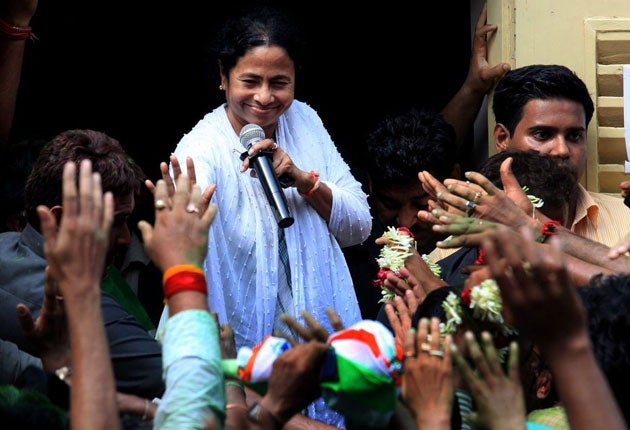India's 'Big Sister' ends 30 years of Communist rule

The steamy city of Kolkata, where peeling walls have for decades been painted red with the symbol of the Hammer and Sickle, is set to turn green.
Thirty-four years after Communists first seized political control of the city, Kolkata and the state of West Bengal have been wrenched from their hands.
The usurper is Mamata Banerjee, a diminutive but feisty woman, who toiled to build grassroots support that within little more than a decade turned into a force the Left could not handle.
Supporters of her party, recognised by its emerald-hued posters, have demanded one of Kolkata's most famous edifices, the Writers' Building, be painted green in celebration. Many of her followers spent the day blowing conch shells in glee and throwing around handfuls of green powder.
"We want to dedicate our victory to our people and motherland," declared Ms Banerjee, after securing a landslide victory, the final details of which were last night still being tallied. "We will give good governance and good administration, not autocracy."
Kolkata, until 1911 the imperial capital of the British Raj, is one of India's most iconic cities. It is famed for its simple coffee shops, lengthy conversations and excellent food.
Bengalis have a love for both culture and discussing politics and it is a place where a taxi driver, dressed in humble clothes, who picks you up at the airport in an ageing black and yellow cab, will spend the entire journey into the city explaining both the merits and failings of land reform, carried out under the Communists' most celebrated leader, Jyoti Basu, who died last year at the age of 95.
Indians from other parts of the country have a joke that one Bengali equals a poet, two Bengalis are a film society, three Bengalis represent a political party while four Bengalis means two political parties.
But visitors to the city often fall prey to over-romanticising Kolkata and ignoring the terrible poverty and hardships endured by so many of its people.
Under the rule of Mr Basu and others, when the Communist Party of India-Marxist became the longest-serving elected Communist government in the world, West Bengal fell behind badly in terms of development, employment and wealth creation compared to other parts of India. The Communists failed to attract foreign investment and a number of corporations looking to set up base there were ultimately pushed away. Kolkata is the only city in India where rickshaws are still pulled by hand.
"West Bengal was once the pride of India. The Communists have ruined it," Sonia Gandhi, head of the Congress Party which has an alliance with Ms Banerjee, recently announced before a crowd of 10,000 villagers at a schoolyard rally in Murshidabad district.
Unlike many of her Communist opponents who perhaps ironically grew up in elevated circumstances, Ms Banerjee was the daughter of a poor teacher. Even now, as head of her breakaway Trinamool Congress party and the railways minister in India's federal government, the woman commonly known as "Didi", or big sister, spurns her ministerial accommodation and lives with her mother in a small, single-storey home with a corrugated roof. She is famed for wearing simple rubber sandals and a plain, white sari.
In the years since 1998, when she first established her party with disaffected members of the Congress Party, Ms Banerjee, who is unmarried, has railed against West Bengal's floundering economy, forced land acquisition and rife corruption. For many among the state's population of 90m, after seven consecutive victories by the Communists her campaign battle-cry of change was too attractive to turn down.
For India's Congress Party, which heads the coalition that controls the federal government, yesterday brought mixed results. While in three of the five states where local elections were held, it secured victory with coalition allies, it lost badly in the southern state of Tamil Nadu. A likely reason for the loss was that its regional ally, the Dravida Munnetra Kazhagam, was at the centre of a notorious corruption telecommunications scandal last year.
For the Communists, yesterday saw nothing but misery. They also lost control of the southern state of Kerala. It means the only place where the once mighty forces of the Left remain in control is the tiny state of Tripura, in the country's north-east.
Buddhadev Bhattacharya, the communists' chief minister in West Bengal, was even forced to endure the shame of losing his own constituency. He had tendered his resignation by mid-afternoon.
It is expected that Ms Banerjee will now in turn resign her cabinet portfolio and become the state's next chief minister, taking over the space vacated by him.
Join our commenting forum
Join thought-provoking conversations, follow other Independent readers and see their replies
Comments
Bookmark popover
Removed from bookmarks